What you can expect here Answers to frequently asked questions from the 2nd semester of Medical Informatics

Hello, I had no idea about Medical Informatics a year ago. Now I'm already in my 2nd semester here in Senftenberg. I'm Julia Schauer and I'm writing this soundbite for anyone who doesn't yet know what they want to study.
Studying with a practical focus. Definitely something that I can apply.
For me, it was like this: I knew that my job should have something to do with technology, but the subject shouldn't be too theoretical either. It had to be practical, but not just with computers, apparatus or annexes, but also something where I could work for and with people. That doesn't exist? That's what I thought at first. But there is one subject that combines many of the topics I wanted: Medical Informatics.
Medical Informatics has a lot to do with technology - and a lot to do with people, even later in your career
Many graduates of the "Medical Computer Science" study programme work with researchers. They are researchers who actually deal with the nerves. In the scientific field of computational neuroscience, scientists want to understand how the human nervous systemprocesses a wide range of information: from sensory impressions to genetic material. Universities need well-trained specialists for such research topics. They need to understand a lot about medicine and Computer Science. If you have studied Medical Informatics, you can work with scientists or become a scientist yourself.
Here in Senftenberg, we also have a lot of practical lessons.
Good jobs in healthcare, research and industry
As a Medical Informatics specialist, you can find a good job not only at universities, but also in the healthcare and medical sectors. Pharmaceutical companies, health insurance companies, the medical device industry - specialists who use technical solutions to connect the world of medicine with the world of data are sought after everywhere. Data has not just been a big topic since "big data". Data is constantly being generated and the amount of data is increasing.
What data is involved in Medical Informatics?
We learn a lot about diagnostic data and patient data from imaging procedures such as X-rays (CT) and magnetic resonance imaging (MRI). Of course, this data must always be kept under lock and key (data protection), but it must still be available to doctors, for example when an operation or patient consultation is involved.
You can work on building secure systems. You may already have an idea of what interesting careers await you if you decide to study Medical Informatics.
But doesn't that make me half a doctor or half a Computer Science graduate?
That's what I thought at first. I thought it would be extremely difficult to study two such complicated specialisms at the same time: Medicine and Computer Science. But that's not the point here. What it's about is the position that combines the two specialisms. It's a subject in its own right. It has to do with medicine and IT, but you're not half a doctor and half an IT specialist when you graduate. You are a real Medical Informatics specialist . And: the material is manageable.
Information processing in people
As a Medical Informatics specialist, you can develop models of biological systems that provide valuable decision-making aids for doctors. Do you know what an automated, model-based analysis of patient data is? Or the simulation of patient behaviour? You will learn all of this during your studies.
And you will be fascinated by the cycles and interactions in biomechanics: how tissue, vessels and the supporting apparatus in the human body are connected to metabolism. The human organism, the psychosomatic system - all of this is so complex that no man-made system can even come close to achieving the same thing. And yet it is possible to depict much of the human system and visualise it in simulations. That's what I'm currently learning, and it's very interesting.
